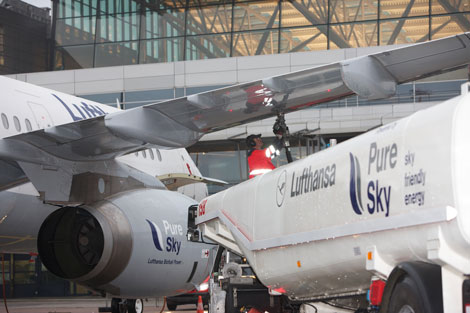Business Traveller reports from Frankfurt following Lufthansa's inaugural commercial biofuel flight.
The German carrier has successfully operated the first of a series of a four-times daily passenger flights between Hamburg and Frankfurt powered, in part, by biofuel.
This is significant because although other carriers such as Qatar Airways, Virgin Atlantic, Air New Zealand and KLM have conducted test flights using biofuel, this six-month trial means the airline will be able to more accurately measure the long-term effects it has on the engines, and prepare the airline for a time when biofuel will hopefully become a viable replacement for traditional kerosene.
Contrary to speculation, the biofuel Lufthansa is using is not used chip fat from McDonald's (a feasible alternative) but a blend of oils, with 80 per cent derived from the seeds of the camelina plant (a non-edible crop that needs little water to grow) and 15 per cent jatropha (a small tree that is native to Central America). The remaining 5 per cent is animal fat, courtesy of a slaughterhouse in Finland, near where the manufacturer, Neste Oil (nesteoil.com), is located.
Once the biosynthetic kerosene has been produced, it is then mixed with 50 per cent conventional jet fuel and used to power one of the engines on the Lufthansa A321 that serves the route.

At the press event before the flight, Joachim Buse, vice-president for aviation biofuel, said: "Today's flight represents the starting point of a new era for environmentally friendly flying," and Business Traveller, which had a seat on 1115 flight LH013, can verify that the plane functioned as normal (as least as far as the passenger experience went) and those passengers who turned up unaware that they would be taking part in a biofuel flight, all seemed to be unfazed by the prospect when they found out.
While the use of biofuel seems like a sensible step forward, one key problem is the cost of it. Lufthansa has invested 6.6 million euros in this particular project, and cites that it costs more per tonne than twice the equivalent quantity of normal jet fuel. This means that it is not yet an economically viable replacement.
Kay Kratky, a member of the Lufthansa German Airlines Board, says: "At the time being, of course [it is more expensive] because we just set up a project and it is very reasonable for it, at the beginning, to be more expensive. But later, in the mass production scale, the price will be much lower."
So how will the use of biofuel affect the price of air tickets? Kratky says: "At this stage it will not affect the price of tickets but maybe at the second or third phases when we roll it out on a bigger scale." He adds, though, that in the long run with mass production, "there will be not such a price difference".
It seems a rare thing for any company to invest money with no obvious promise of an economical return on that investment, so what motivated Lufthansa to make this move? Buse says: "The decision to spend this money was made in the middle of our [financial] crisis and, while we were trying to save money wherever we could, the board felt this was so important – despite all the difficulties we are facing – we needed to spend this money in order to bring the industry forward."
He adds: "The aviation industry has committed to mitigate climate change and using biofuels is the option of choice we are taking in order in order to have a better CO2 emission ratio. For the time being there is no economical incentive but we hope that, in the long-term, biofuels will be competitive. We hope that more airlines will join Lufthansa in deciding biofuels are the best way to reduce CO2 emissions."
When the EU Emissions Trading Scheme (a system that will require airlines to pay for carbon credits if they exceed their free allowances) comes into play next year, it will mean that the lower an airline's CO2 emissions, the less money it will have to pay in additional credits. In light of this, Buse says: "Hopefully, in the future, we will actually save money by using biofuel." This is because it will be able to "trade off with ETS certificates for those quantities of biofuel that will show a CO2 improvement of at least 35 per cent". (Click here for information on the EU ETS.)
So how exactly is biofuel better for the environment? Buse says: "The balance of CO2 emissions [from biofuel] is roughly 50 per cent better [than normal kerosene] due to the photosynthesis [a process which sees carbon dioxide absorbed from the atmosphere and oxygen released] of the plants we use to get this feedstock. Burning the biofuel means we are emitting the same amount of CO2 but the plants that have produced these vegetable oils have taken out roughly 50 per cent of the CO2 amounts released."
Lufthansa says that during this six-month trial, the use of biofuel with reduce CO2 by up to 1,500 tonnes. (Click here to see our data visualization to see carbon emissions in context.)
Last month KLM became the first carrier to operate a scheduled flight using biofuels between Amsterdam and Paris (see online news June 29), with regular scheduled trials on the route due to start in September. Thomson Airways has also announced a biofuels trial, with its first flight set to take place on July 28 between Birmingham and Palma (see online news July 1).
And next week, Finnair will operate the first of three flights between Amsterdam and Helsinki that are powered by biofuel made from used cooking oil mixed with 50 per cent kerosene in both engines. It says that this will be the longest commercial route flown so far with biofuel.
Visit lufthansa.com
By Jenny Southan








